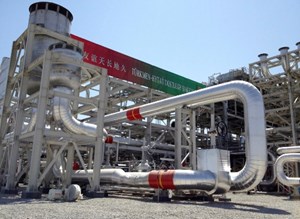China prioritizing Turkmenistan over Russia in next big pipeline project
(Reuters) - China is accelerating the building of a long-delayed Central Asian pipeline to source gas from Turkmenistan even as Russia pushes its own new Siberian connection, as Beijing juggles its energy security needs with diplomatic priorities.

Beijing is keen to bolster Central Asia ties under its Belt & Road Initiative, but nearly a decade after construction began, the "Line D" project has been hobbled by complex price talks and the technical hurdles of laying a pipeline crossing another three central Asian nations, Chinese state oil officials said.
But Moscow's recent push to land its second Siberia pipeline connection with China, the Power of Siberia 2, to make up for shrunken sales in Europe due to the Ukraine crisis, provides Beijing a lever to advance the central Asian project, according to Chinese oil officials and industry consultants.
"Central Asian pipelines are considered a cornerstone investment in China's energy and geopolitical space. It's a supply channel with strategic value that supersedes commercial concerns," a state-oil official familiar with China National Petroleum Corp's (CNPC) global strategy told Reuters.
China may eventually seal both deals to feed its massive long-term gas needs, but is prioritizing Turkmenistan, industry officials said, as Beijing has long seen Central Asia as a frontier to expand trade, secure energy and maintain stability in its once-restive western Xinjiang region.
Combined, multi-year contracts worth tens of billions of dollars to bring gas via both pipelines would meet 20% of China's current demand. The pipelines are key to Beijing's goal of using gas as a bridge fuel towards its carbon neutrality targets and also helping to shield it from the volatile tanker-carried liquefied natural gas (LNG) market.
Estimated in 2014 to cost $6.7 B, Line D would carry 30 billion cubic meters of gas a year.
Speaking last week at the first in-person summit of central Asian leaders in the ancient Silk Road city of Xian, President Xi Jinping urged parties to accelerate laying Line D, which would be China's fourth gas pipeline to the region, almost a decade after the start of construction in Tajikistan.
In 2022, China imported 35 bcm gas or worth $10.3 B via three pipelines from Turkmenistan, compared with 16 bcm via a single pipeline from Russia at about $4 B.
“Line D getting ready”
Reflecting renewed urgency, CNPC last week launched the feasibility study for a 200-kilometer connection from Xinjiang's border with Kyrgyzstan to the Chinese town of Wuqia as the first receiving point, said a senior source involved in appraising the project.
"This means D Line is getting ready," the person told Reuters, adding that construction on the domestic trunkline in Xinjiang could begin next year.
Separately, a CNPC official told Reuters last week that the company's commercial teams are "standing by" awaiting a mandate to advance the project, without elaborating.
Without a final gas supply contract, CNPC has only built part of the first tunnel in the mountainous Tajikistan capital Dushanbe where Line D begins, the official said.
China's state planner the National Development and Reform Commission did not immediately respond to a request for comment.
A CNPC spokesperson declined to comment.
Consultancy SIA Energy and Rystad Energy predicted new Turkmenistan gas via Line D could start flowing around 2028 while a new Russian line, designed at 50 bcm a year that sources gas from West Siberia, could start operating in the early 2030s.
Import losses
China is paying some 30% more for Turkmen gas, delivered via three existing pipelines since 2009, than from Russia, which began pumping the fuel from East Siberia in late 2019, Chinese customs data showed.
Facing years of import losses as it is unable to pass on the cost to a regulated domestic market, CNPC has failed to negotiate a lower price for Turkmen fuel in rounds of price reviews, a second industry source with knowledge of the matter told Reuters.
Ashgabat wanted to be paid "in line with global pricing practices", a Turkmenistan official familiar with the talks said.
Sources and officials declined to be named as they are not authorized to speak with media.
Russia overtures
Still, the price negotiations are likely to be complex as China has multiple supply options that also include domestic production and new long-term LNG contracts with Qatar and the United States, said Jason Feer, Houston-based head of business intelligence at consultancy Poten & Partners.
"The prices need to be high enough to justify the expense of building an expensive pipeline but low enough to be competitive," said Feer.
Moscow's recent overtures to fast-track the shorter Power of Siberia 2 connection, via Mongolia, and a more recent proposal by Almaty to supply China via Khazakhstan offered CNPC leverage in finalizing the Turkmen link, said the CNPC official and the second industry source.
"CNPC could use the Russian proposals to bargain for a better price for Line D while taking its time to discuss new Russian supplies," said the second source.
Related News
Related News

- Woodfibre LNG receives BCEAO order to move floatel to site to house non-local workforce
- QatarEnergy, Exxon seek to remove contractor from Texas gas project
- Veolia, Waga Energy and ENGIE collaborate to develop renewable natural gas industry in France
- Congo Brazzaville becomes an LNG exporting country
- Fulcrum LNG to pair with McDermott, Baker Hughes for Guyana gas project
- EU approves law to hit gas imports with methane emissions limit
- Veolia, Waga Energy and ENGIE collaborate to develop renewable natural gas industry in France
- Hawai'i Gas selects Eurus Energy America, Bana Pacific for hydrogen and renewable natural gas projects
- TotalEnergies increases LNG deliveries to Asia with two new contracts
- Desert Mountain Energy Corp. initiates helium production



Comments